The story of Barfoot & Thompson, Auckland’s oldest and biggest real estate agency, is really the story of Auckland.
When the city still had horses with carts, the agency was setting up shop in Newmarket.
And as Auckland spread outwards, so did the real estate company, pushing into new frontiers, north, south, east and west, transforming from a one-man operation to a real estate giant employing thousands of people.
Barfoot & Thompson turns 100 this month, but it’s still very much a family firm at heart.
Start your property search
It has seen boom times and lean times, and all manner of global and local events that have had an impact on the company’s growth, including the Great Depression of the 1930s, World War II, population surges, stock market crashes and a global pandemic.
Over the decades, kauri villas made way for California bungalows and then an array of home designs, from boxy state houses to mid-century modern to architectural masterpieces to today’s terrace housing.
The company has marked its birthday with a special book, Barfoot & Thompson 1923-2023, 100 Years. It notes that perhaps the most significant advance of all in Auckland’s housing market was the indoor toilet, apparently made possible by the arrival of the ball-valve cistern and mains sewerage.
Read more:
- 'The little white boy in the heart of Ōtāhuhu. Boy, it taught me a lot'
- Best auction of the year: Deceased estate sends bidders into a frenzy
- Auckland first-home buyer scores apartment for $25,000
Barfoot & Thompson comprises more than 80 branches, employs more than 1800 salespeople and, in what has become a highly competitive industry, has a 40% share of the Auckland residential real estate market.
Generations of family members have worked for the agency, with the company name reflecting the two founding families.
Currently, three directors from the third generation are in charge, including the company’s first female director, but some fourth generation now also working for the company.
There are also multi-generations of staff members from the same families who have also worked for the firm through the years.
The centenary book describes how it all started. One hundred years ago quiet and shy Val Barfoot stepped off a ship from England hoping New Zealand would be a land of opportunity.
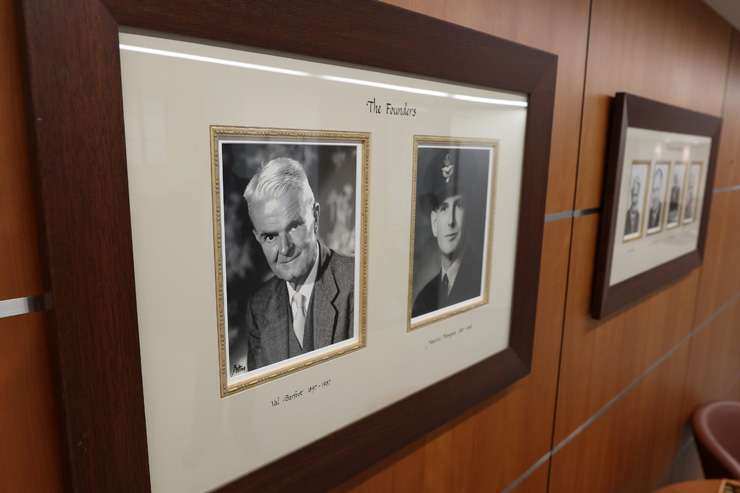
Barfoot & Thompsons founders have a big presence in the agency’s head office in Auckland’s Shortland Street. Photo / Fiona Goodall
He was only 25 but already a veteran of the Great War of 1914-1918 having fought in Ypres on the Western Front.
According to the book, Val never said much about the war but did recall at war’s end men “drowning in the stinking mud of the battlefield” during drunken Armistice celebrations, something which made him swear off alcohol for life.
He walked into a Newmarket office one day thinking it was that of a land agent and while he had no experience selling houses he offered to work for free for a week. The office turned out to be a betting shop and when the owner popped out for cigarettes he disappeared into a pub up the road.
Val disapproved but he also noticed the location was great with a steady stream of foot, horse and motorised traffic.
At the time Auckland’s population was growing fast and there was a land boom underway. Val bought out the business for 75 pounds and set about selling real estate – on March 27 an advertisement appeared in the Auckland Star advising he had sold the home of a D Stuart.
The rest, as they say, is history. Current family members say a lot of that history is trailblazing and that the company’s success is down to the different generations of family members overlapping and passing on expertise, and also the special relationship with Auckland, and Aucklanders, that has been built over the years.
Unlike real estate companies with franchises all over the country, Barfoot & Thompson has largely stuck to Auckland – they know the roads backwards and reckon new builds aside someone from the company has sold nearly every house in the city at least once.
Back in the 1920s, Val Barfoot brought his brother Kelland into the company, which became Barfoot Bros, and brought his sweetheart Christine over from England who he married.
Christine was also a trailblazer in her own right because in 1926, when the Real Estate Institute of New Zealand established a qualification for real estate agents she became the first woman to pass the exam, even before the brothers did.
The company started out on a high but real estate is a rollercoaster business and in 1929 the stock market crashed beginning 10 years of severe economic depression.
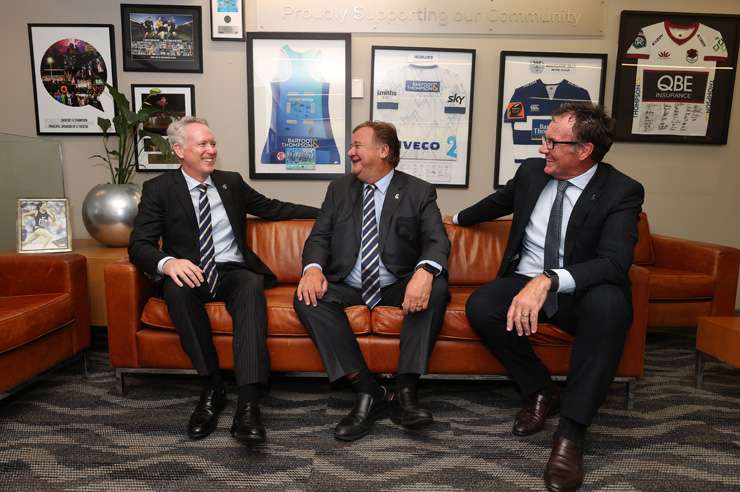
Barfoot & Thompson’s leading men: Stephen Barfoot, Peter Thompson and Chris Dobbie. Photo / Fiona Goodall
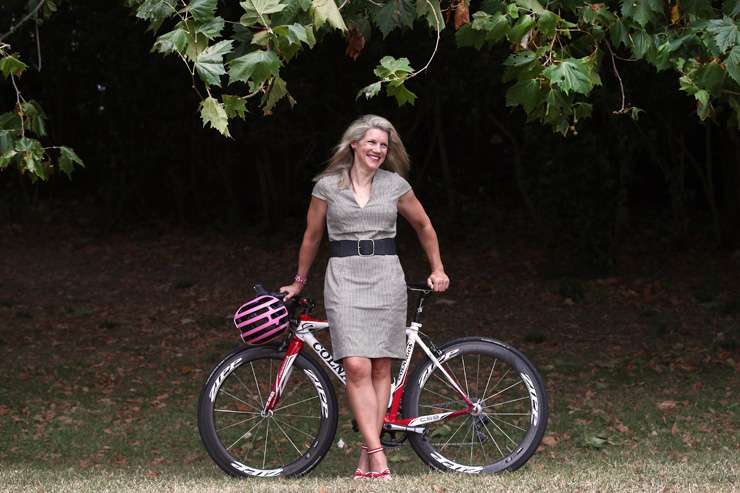
Barfoot & Thompson director Kiri Barfoot says gender and pay equity have come a long way since the company’s early beginnings. Photo / Fiona Goodall
People lost jobs, relief camps and soup kitchens were set up and wages plummeted, says the book. House prices plummeted, too, with homes that sold easily for 2000 pounds in 1928 not selling for half that five years later.
Property management kept the company going and in 1934 there was another big development for the Barfoot brothers because along came Maurice, who would become the Thompson part of the company name.
Maurice Thompson was a bit of a charmer with the gift of the gab and a knack for sales – he had once sold washing machines door to door while riding a motorcycle with a sidecar.
His father had been worried about his son’s “fecklessness”, according to the book, and asked the Barfoots if they would take him on.
They did and they were so impressed they offered him a third share of the business in order to retain him when he went off to war.
The company went from strength to strength and by the time Val Barfoot retired in 1973 there were more than 30 branches and more than 300 employees.
THE THREE current directors are direct descendants of the different family lines.
Managing director Peter Thompson is Maurice Thompson’s grandson and Kiri Barfoot is Val and Christine’s granddaughter from their son Garth. The other director is her cousin Stephen who is the son of Chris Barfoot, also a company stalwart.
Peter Thompson began in the business after school, aged nine or 10, then joined full time in the 1980s aged 18.
He told OneRoof the first five years of his career were the best. Real estate was simpler back then, when handshakes meant more and it was more fun.
You worked hard and played hard in the days when sales agreements were a mere two pages long as opposed to today’s eight or nine pages, he says.
Thompson had grown up a “little white boy from the Eastern suburbs” and was sent off to the Otahuhu office where he encountered a life he had not known about.
He worked in the property arm, meeting gang members from the Mongrel Mob to the Head Hunters who rented from the company and who had to be kept apart to stop fighting break out.
He also encountered fleas and cockroaches for the first time when he had to break into tenants’ homes only to find they had scarpered but the insects had multiplied.
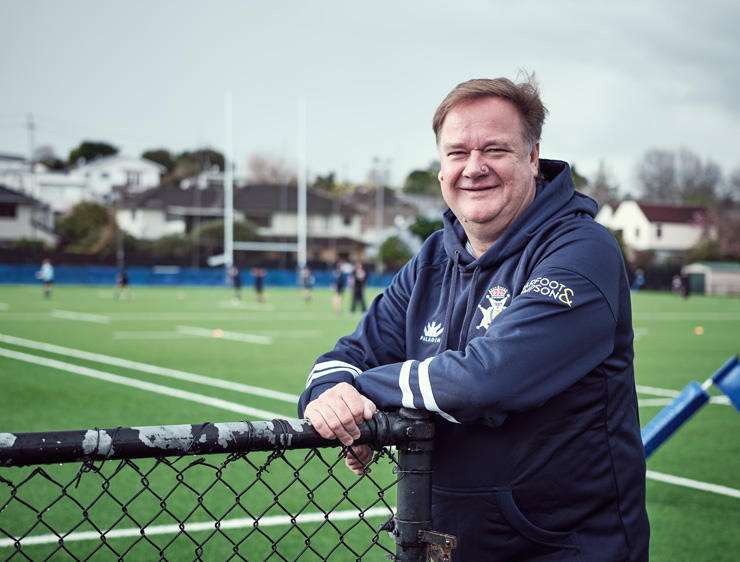
Managing director Peter Thompson says the first years of his career were his best. Photo / Fiona Goodall
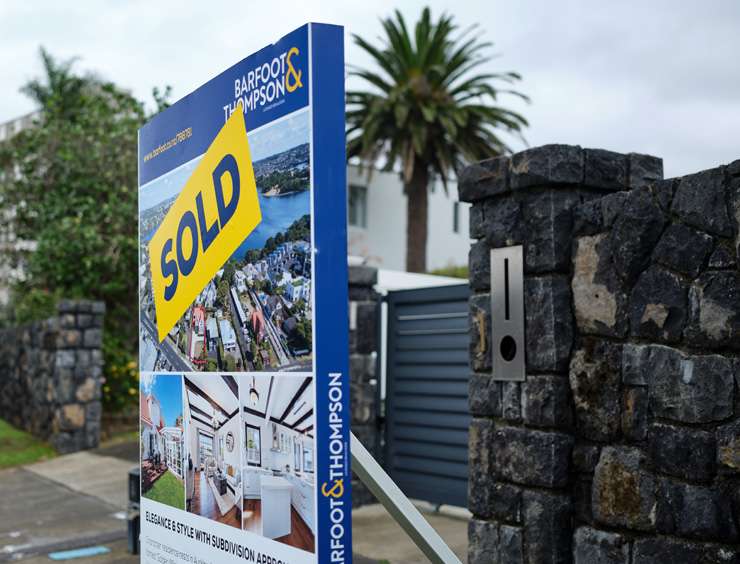
Much of Auckland’s real estate stock has a connection to Barfoot & Thompson, with the agency still the biggest in the city. Photo / Fiona Goodall
On cockroaches he says “even today I haven’t seen some as big as those first few years” and as for fleas “you’d go in with a nice light suit and come out black covered with them”.
Thompson remembers running for his life when chased by an Alsatian dog which had been left locked in a house after tenants had fled, losing a shoe along the way and diving into his ford avenger car while the dog chewed up his door.
Thompson has seen many changes in real estate, including times when agents’ were ranked lower than car salesmen but he says the industry has worked hard to improve that.
He says today Barfoot & Thompson has a multicultural staff and plenty of women agents, whereas back in Christine Barfoot’s pioneering day real estate was very much a man’s world.
Thompson recalls his uncle Monty not hiring women until the 1970s and 1980s when it was realised women made most of the buying decisions based on things like kitchens. Now, the sales team across the company is roughly half men and half women.
Thompson is proud of the company’s relationship with Auckland, saying it gives back through many sponsorships and donations.
While Barfoot & Thompson has expanded beyond Auckland’s boundaries, including opening a property management division in Tauranga and last year buying a 50% shareholding in Lodge Real Estate company in Hamilton, he says the company is an Auckland one “through and through”.
Aucklanders trust them, he says: “They come back to us. They list with us and they sell their properties and buy their properties through us, and multi generations.”
Staff stick around, too, he says, with around 180 people currently employed who have over 20 years’ service – “what other industry and what other organisation can make that statement?”
Thompson does not have statistics for how many homes have been sold over the 100 years but says the average since 2000 is around 15,000 a year, sometimes a few more, sometimes a few less.
The leanest time for the company was probably the share market crash of 1987 – and now, because today’s market is not much better in terms of sales volumes, he says.
“It’s getting pretty close to what we saw in ’87 yet 12 months ago we were on the other extreme of record highs.”
Kiri Barfoot, the company’s first woman director, says equality and pay equity have come a long way, though she would like to see more women in management.
For some reason, women lack confidence to put their names forward for management roles and sometimes she’s still the only woman in meetings. That’s something she thinks her grandmother Christine would raise her eyebrows at.
“She’d be quite proud it’s 50/50 in sales people but she’d probably be a little bit disappointed when she looked at the management team I’d imagine.”

Inside a packed Barfoot & Thompson auction room during the during the 2015 boom. Photo / Jason Oxenham
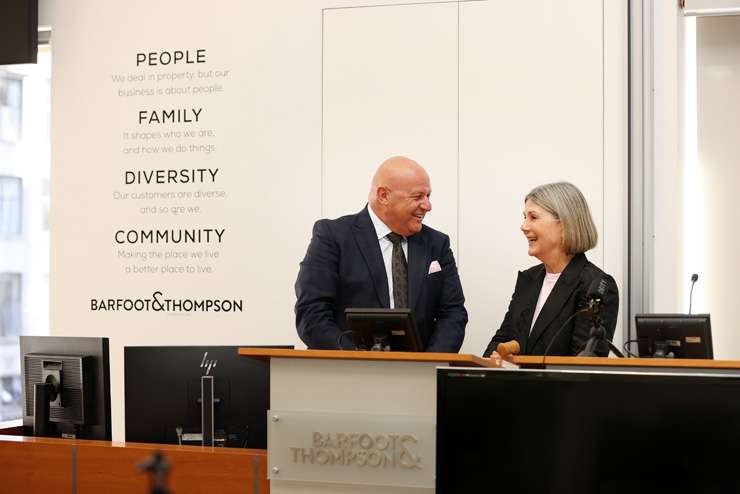
Lead auctioneers Murray Smith and Marian Tolich. Photo / Fiona Goodall
Kiri recalls Christine as being the fun grandmother, saying she was a “cool” lady with purple hair who let the grandkids eat chocolate yoghurt, a novelty of the day, and have a lot of freedom at the beach.
While Christine qualified as an agent, she thinks her grandmother’s role was more a mentor and confidante for grandfather Val, saying she had four boys to raise.
“You can imagine what it would be like in the late 1920s and 1930s raising kids like that with no modern day appliances and having to do your own washing and dishes and cooking meals from scratch.
“I think they lived a pretty basic life. They originally lived by the Panmure lagoon and I think they had cows in the backyard.”
Kiri’s father is Garth, 86, who after 40 years in the company retired as a director in 2017, but she doesn’t remember conversations about real estate dominating the dinner table, saying it was not a foregone conclusion subsequent generations would go into the business.
She says her strong female role models, including Christine and her own mother who was a doctor, meant she did not do the female subjects of typing or cooking at school. She knew back then she wanted to be a manager, going first into accountancy then travelling and on her return her father offered her a job in property management, still an important part of the business.
“I found property management really opened your eyes to how people and money and houses behave, the good and the bad,” she says.
Kiri, who went on to be a top salesperson, has a son and a daughter but is not pressuring them to enter the business, and says only time will tell if Barfoot & Thompson is still a family firm in another 100 years.
That’s partly because with every generation there are fewer children and not all will necessarily have children of their own, she says.
“Younger people (generally) are saying ‘well, I don’t know, do I even want kids?’ so I guess it’s a challenge of succession planning in family businesses.”
The third director, Stephen Barfoot, had a career in IT before joining the firm.
“I never wanted to go in from school,” he says.
“I never wanted to be looked upon as the guy who was there because he was the boss’s son – I wanted to be there because I had something to offer.”
When he was tapped on the shoulder to join because of his technology experience he says he went into sales first to learn the trade.

A woman walk past a Barfoot & Thompson office in 2020, just as the market was picking up and sales started going through the roof. Photo / Ted Baghurst
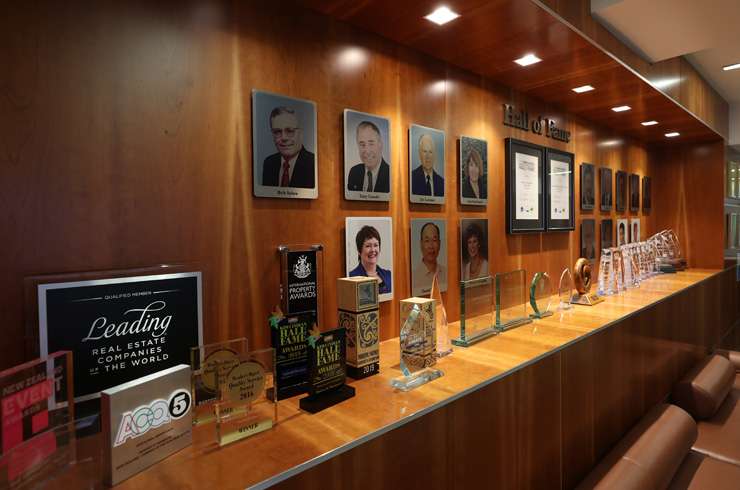
The Barfoot & Thompson Hall of Fame. Photo / Fiona Goodall
Stephen says Barfoot & Thompson’s point of difference is how the company is structured - it is one company with branches rather than franchises which are like separate companies.
If people list with a franchise company salesperson that is the only person who can sell the property, he explains, but if they list with Barfoot & Thompson any salesperson from the company can bring buyers through, meaning there are a lot more people seeing the home and that is likely to get them a better price.
The structure does make IT a little challenging, though, he says. Where franchise companies can use “off the shelf” IT systems, Barfoot & Thompson would break those because of the massive internal market place of listings and sales.
Stephen can’t think of a business model that comes close in New Zealand or Australia. He thinks the company’s strength is in the loyalty it invokes in employees, and in the different personality styles of each family line.
“My grandfather (Val) was English. He was very intelligent but quite shy. He got the business to a certain size.”
But big personalities are important in sales so when Maurice Thompson arrived he was the perfect foil for Val, Stephen says.
“It’s interesting how through the generations those personality types have kind of remained relatively constant.
“You need both. It’s a combination of the two personality types – that’s where the magic is.”











































































